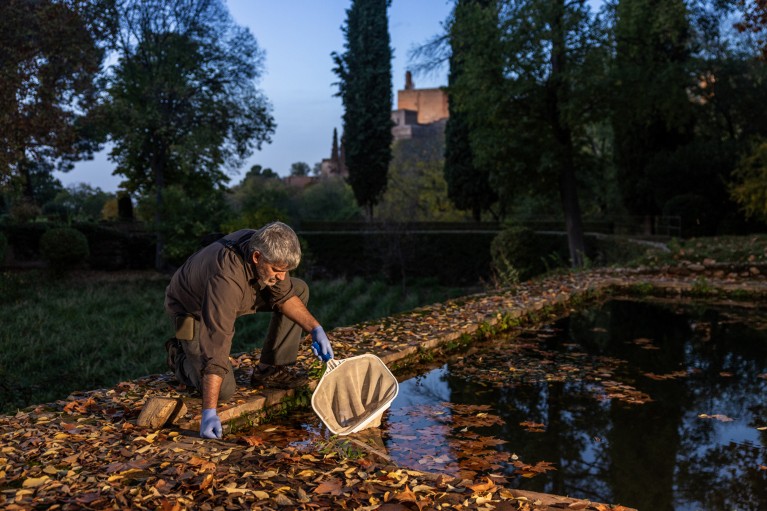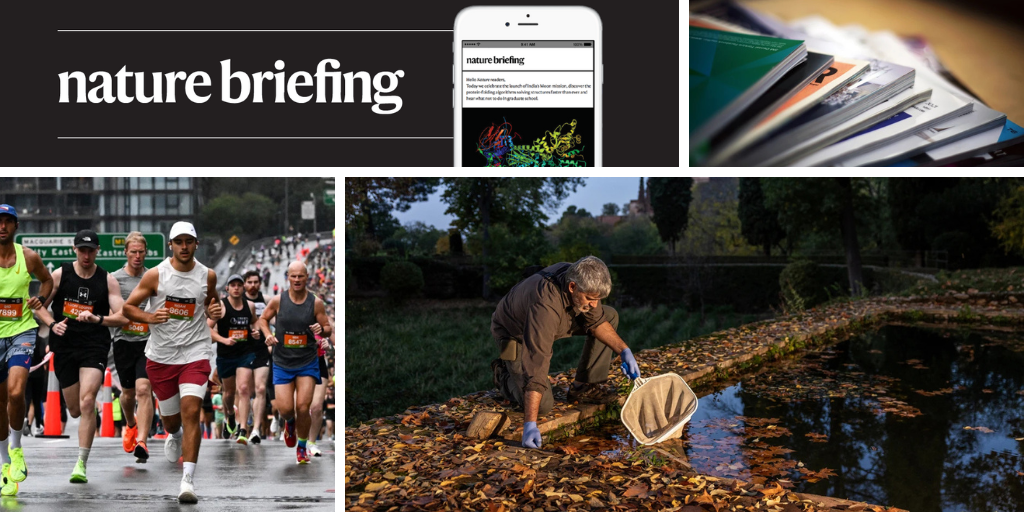You have full access to this article via your institution.
Hello Nature readers, would you like to get this Briefing in your inbox free every day? Sign up here.

Marathon runners saw myelin levels drop temporarily post-race in areas of the brain involved in motor control and sensory and emotional processing.Credit: Saeed Khan/AFP/Getty
Brain scans of marathon runners suggest that myelin — a fatty substance that insulates the electrical signals transmitted by nerve cells — might also be a source of energy for the brain. After a race, runners’ levels of myelin are lower in areas involved in motor control and sensory and emotional processing than before they set off. The loss doesn’t seem to affect cognitive function, and levels bounced back after a couple of months. The experience might even be beneficial because it “exercises the brain’s metabolic machinery”, says neuroscientist, runner and study co-author Carlos Matute.
Reference: Nature Metabolism paper, or read the authors’ own plain-language summary in the Research Briefing (6 min read, Nature paywall)
Sharing first authorship on a paper doesn’t come with a reputational penalty, even for the person named second — at least under experimental conditions. In a study, a panel of experts scored seven aspects of a fictional physicist’s academic success on the basis of three papers. The scores were largely the same, regardless of whether the physicist was listed as sole first author, first author listed first, or first author listed second. The psychologists behind the study, Miriam Schilbach and Julian Decius, decided to put their money where their mouths are: they shared first authorship and decided whom to list first by rolling dice.
Reference: Scientometrics paper
An immigration crackdown ordered by the administration of US President Donald Trump is rattling the global research community, with high-profile detentions and deportations of academics stoking fears even for travellers with valid entry documents. Some researchers outside the US who spoke to Nature are reconsidering plans to travel to the country. And scientists and students in the US who aren’t citizens are weighing up their travel plans for fear that they won’t be allowed back in if they leave. “The anxiety is palpable,” says US immigration lawyer Jonathan Grode, who says he is fielding at least 20 calls a day from clients who ask if it is safe for them to travel.
Features & opinion
Women are far more likely to develop Alzheimer’s than men — and not just because they tend to live longer. The disease might be partly linked to the hormonal changes that accompany menopause. Oestrogen helps neurons to use glucose for energy; when levels of this hormone drop, neurons start to consume the brain’s white matter, which ultimately can exacerbate the risk of Alzheimer’s disease. One study found that hormone-replacement therapy can lower a woman’s risk of Alzheimer’s by around 40%, although other studies disagree. Sociocultural factors could play a role, too: education and mentally stimulating careers can stave off Alzheimer’s symptoms, but women have historically been excluded from higher education and the skilled workforce.
Glaciers aren’t just ice, write a group of environmental scientists and ecologists: they’re teeming with microbial life that could be untapped sources of useful molecules. Any efforts to slow, halt or reverse glacier melting need to consider the impact they’ll have on this icy biome. Scientists should be required to provide an evidence-based framework for proposed glacier-saving interventions, including rigorous testing of the environmental sustainability and safety of any materials involved. Without such regulation, glacier-saving interventions “might risk the deterioration of life in the ecosystem that is meant to be saved”, the group writes.
There’s plenty of evidence that intermittent fasting can be an effective strategy for weight loss, but scientists are still exploring what other benefits might come from limiting food intake to particular windows of time. Does it protect against neurodegenerative diseases such as Alzheimer’s disease, enhance cognitive function, suppress tumours and even extend lifespan? Or is it merely an easy way to cut back on calories? And what are the potential risks?
Where I work

Juan Ramón Fernández Cardenete is a biologist at the Alhambra Palace in Granada, Spain.Credit: Ugo Mellone for Nature
Biologist Juan Ramón Fernández Cardenete studies the biodiversity in the water features and gardens of the Alhambra Palace in southern Spain. “When I began working here, only two amphibian species remained; the others had disappeared owing to water pollution,” he says. “Now, thanks to reintroduction efforts and careful management, four species are thriving. The individuals I’m observing today are the direct descendants of those I released years ago.” (Nature | 3 min read)
I’ll take any excuse to go swimming, and the wilder the better — knowing that any momentary discomfort will be far outweighed by a full day of smug feels. Now the biggest survey of open-water swimmers to date has shown that the key to the activity’s wellbeing boost lies in feelings of “freedom and mastery” — rather than social connection, say, which is another reason many people choose to take the plunge.
While I wriggle into my wetsuit, why not tell us what you think of this newsletter? Please send your feedback to [email protected].
Thanks for reading,
Flora Graham, senior editor, Nature Briefing
With contributions by Jacob Smith and Sara Reardon
Want more? Sign up to our other free Nature Briefing newsletters:
• Nature Briefing: Careers — insights, advice and award-winning journalism to help you optimize your working life
• Nature Briefing: Microbiology — the most abundant living entities on our planet — microorganisms — and the role they play in health, the environment and food systems
• Nature Briefing: Anthropocene — climate change, biodiversity, sustainability and geoengineering
• Nature Briefing: AI & Robotics — 100% written by humans, of course
• Nature Briefing: Cancer — a weekly newsletter written with cancer researchers in mind
• Nature Briefing: Translational Research — covers biotechnology, drug discovery and pharma


